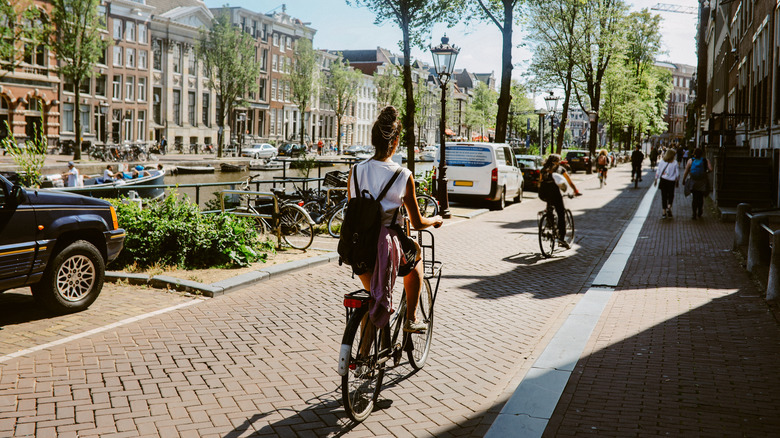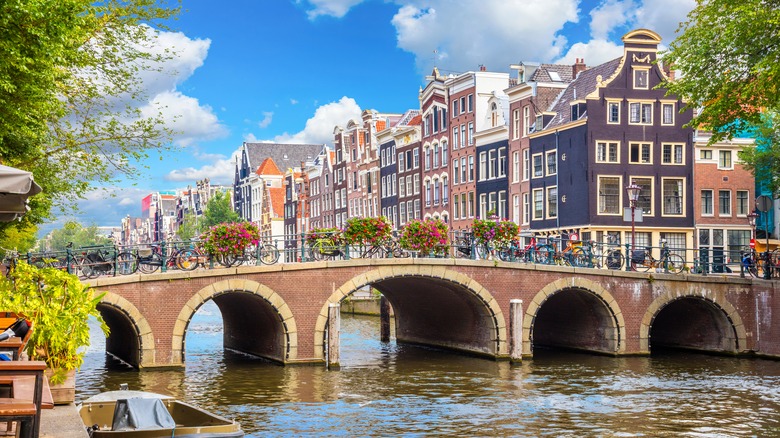Traveling To This Popular Destination Will Cost Tourists More Than Any Other European City
Traveling to Europe is about to become more expensive, especially if you visit its most popular cities. Granted, heading to the continent has notably become a costly affair in recent years, with airfare alone costing over $1,000, and hotel rates skyrocketing at an unprecedented pace. But apparently, on top of the usual expenses like flights, lodging, food, and activities, you also have one more expenditure to factor into your budget: tourist tax. In all of Europe, Amsterdam happens to have the highest tourist tax.
Tourist taxes in Europe are nothing new, with the European Commission noting that 18 of its member states collect this fee from visitors, although rates vary per city. They are usually charged on top of your accommodation, regardless if you stay in a hotel or an Airbnb, and are required for each night of your stay. For instance, you can expect to pay a "bed tax" that is equivalent to roughly 5% of your total when you stay in German cities like Berlin and Frankfurt. Meanwhile, in Belgium, an add-on of €7.50 (or $7.95) is set on top of your nightly room rate in cities like Antwerp and Bruges. If you're keen on exploring Amsterdam, however, you'll want to funnel more funds into your travel budget. As it stands, the Dutch city imposes a 7% tourist tax on visitors and an extra €3 (or $3.18) for each additional occupant. Think that's too much? Well, it's bound to get even more costly, as the city announced that it will charge more in 2024.
Amsterdam's tourist tax hike will take effect in 2024
With its awe-striking canals, world-class museums, and rich culture and history, it's no wonder why people from all over the world come in droves to explore Amsterdam. However, the financial burden that is associated with its upkeep has been placed on its residents, which is why the city decided to transfer some of the responsibility to visitors. Starting in 2024, it will be imposing a significant increase in tourist taxes, raising it to 12.5%. According to Amsterdam's 2024 budget, an average hotel room rate of €175 (or $185) will receive an increase of €15.25 to €21.80, or $16.18 to $23.12 in 2024.
Hester van Buren, deputy mayor for finance, said in the statement that the money collected will go straight to the maintenance costs. "Visitors will thus help to pay for the City to carry out its tasks," she said. "This allows us to address the consequences of overtourism and direct additional resources to keeping the streets clean and solving acute problems in neighborhoods and districts."
This isn't the first time that Amsterdam has raised its tourist tax. In 2020, the city asked tourists to pay an additional €3 (or $3.18) per night they stayed in the city. "Visitors will contribute more to the high costs of keeping the city safe and clean, and of keeping the public space like pavements, quays, bridges and streets, in a good state," a spokesperson for the city council told CNN at the time.
Other European cities have also increased tourist taxes
Amsterdam is not the only city that has imposed higher taxes on tourists. Some cities have also made the executive decision to collect more fees from their visitors, while others are introducing tourist taxes for the first time. In January 2023, Barcelona revealed that it's employing a "scaled increase" in its tourist taxes from 2023 to 2024. The Independent reported that Barcelona planned two price hikes: €1.75 to €2.75, or $1.91 to $2.91, starting April 2023, which will increase to $3.91 beginning April 2024. Meanwhile, the city of Venice announced that it's doing a trial run in 2024 of charging a €5 (or $5.40) fee to day-trip visitors. "Residents will get a better quality of life, and overnight visitors will experience more vivid emotions," Simone Venturini, the city councilor for tourism, said in a statement (via CNN).
All these added costs on tourists are not intended to dissuade people from visiting; it's actually quite the opposite. Through the financial contributions of tourists, cities are able to do a better job of maintaining pretty much everything they have to offer. "Back in the day, it used to be that tourism was tax-free. Now it's like, 'No it's not — you should tax tourism to capture some of that value to add to the community,'" tourism consultant Peter Rømer Hansen explained to The New York Times. "It's a paradigm shift."


